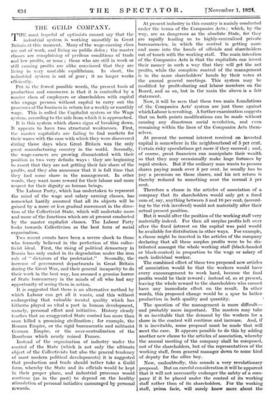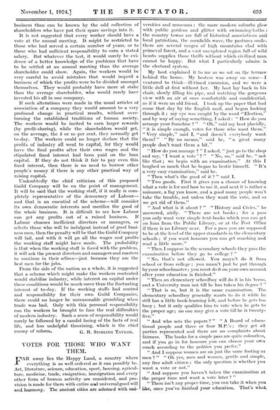THE GUILD COMPANY.
THE most hopeful of optimists cannot say that the industrial system is working smoothly in Great Britain at this moment. Many of the wage-earning class arc out of work, and living on public doles ; the master classes are complaining of perilous conditions of trade and low profits, or none ; those who are still in work or still earning profits are alike convinced that they are living in very unstable equilibrium. In short, the industrial system is out of gear ; it no longer works efficiently.
Put in the fewest possible words, the present basis of production and commerce is that it is controlled by a master class of employers or shareholders with capital who engage persons without capital to carry out the processes of the business in return for a weekly or monthly wage. This is called the Capitalist system or the Wage system, according to the side from which it is approached.
It is this system which shows signs of breaking down. It appears to have two structural weaknesses. First, the master capitalists are failing to find markets for their wares with the ease with which they were discovered during those days when Great Britain was the only great manufacturing country in the world. Secondly, the wage-earners are growing discontented with their position in two very definite ways : they are beginning to assert that they are not getting their fair share of the profits, and they also announce that it is full time that they had some share in the management. In other words, they want more reward for their labour and more respect for their dignity as human beings.
The Labour Party, which has undertaken to represent the mind of the wage and salary earning classes, has somewhat hastily assumed that all its objects will be gained by a more or less gradual movement in the direc- tion of the Collectivist State, which will undertake more and more of the functions which are at present conducted by the master capitalist classes. The Labour Party looks towards Collectivism as the best form of social organization.
Two recent events have been a severe shock to those who formerly believed in the perfection of this collec- tivist ideal. First, the rising of political democracy in Russia has only ended in its degradation under the iron rule of " dictators of the proletariat." Secondly, the increase of government departments in Great Britain during the Great War, and their general incapacity to do their work in the best way, has aroused a genuine horror of State bureaucracy in the minds of all who had any opportunity of seeing them in action.
It is suggested that there is an alternative method by which Labour can get all it wants, and this without endangering that valuable mental quality which has hitherto played so vital a part in human development, namely, personal effort and initiative. History clearly teaches that an exaggerated State control has more than once killed a promising civilization ; for example, the Roman Empire, or the rigid bureaucratic and militarist German Empire, or the over-centralization of the Bourbons which nearly ruined France. • Instead of the organization of industry under the control of the State (which is not only the ultimate object of the Collectivists but also the general tendency of most modern political developments) it is suggested that production and trade should rather take a Guild form, whereby the State and its officials would be kept in their proper place, and industrial processes would- continue (as in the past) to depend on the healthy stimulation of personal initiative encouraged by personal rewards, At present industry in this country is mainly conducted under the terms of the Companies Acts ; which, by the way, are as dangerous as the absolute State, for they are rapidly leading us to highly-centralized private bureaucracies, in which the control is getting more and more into the hands of officials and shareholders out of touch with the working staff. The main intention of the Companies Acts is that the capitalists can invest their money in such a way that they will get the net profits, while the complete control of the management is in the same shareholders' hands by their votes at the annual general meetings. This system may be modified by profrt-sharing and labour members on the Board, and so on, but in the main the above is a fair statement.
Now, it will be seen that these two main foundations of the Companies Acts' system are just those against which Labour is revolting. A further examination suggests that on both points modifications can be made without causing any disastrous social revolution, and even remaining within the lines of the Companies Acts them- selves.
At present the normal interest received on invested capital is somewhere in the neighbourhood of 5 per cent. Certain risky speculations get more if they succeed ; and, of course, great financiers can manipulate their wealth so that they may occasionally make huge fortunes by rapid strokes. But if the ordinary man wants to possess shares paying much over 5 per cent. he usually has to pay a premium on those shares, and his net return is thereby reduced to something near the normal 5 per cent.
Therefore a clause in the articles of association of a company that its shareholders would only get a fixed sum of, say, anything between 5 and 10 per cent. (accord- ing to the risk involved) would not materially alter their actual present position.
But it would alter the position of the working staff- very materially indeed. For then all surplus profits left over after the fixed interest on the capital was paid would- be available for distribution in other ways. For example, a clause might be inserted in the articles of the company declaring that all these surplus profits were to be dis- tributed amongst the whole working staff (black-handed or black-coated) in proportion to the wage or salary of each individual worker.
The combined effect of these two proposed new articles of association would be that the workers would have every encouragement to work hard, because the final profits would be their reward ; instead of, as at present, leaving the whole reward to the shareholders who cannot have any immediate effect on the result. In other words, this proposed change would be a spur to better production in .both quality and quantity.
The question of the management is more difficult— and probably more important. The masters may take it as inevitable that the demand by the workers for a share in the control will continue and increase. And, if it is inevitable, some proposal must be made that will meet the case. It appears possible to do this by adding another new clause to the articles of association, whereby the annual meeting of the company shall be composed, not of the shareholders, but of the representatives of the working staff, from general manager down to some kind of deputy for the office boy.
Now, undoubtedly, this sounds a very revolutionary proposal. But on careful consideration it will be.apparent that it will not necessarily endanger the safety of a com- pany if it be placed under the control of its working staff rather than of its shareholders. For the working staff, prima facie, will surely know .more .about the business than can be known by the odd collection of shareholders who have put their spare savings into it.
It is not suggested that every worker should have a vote at the annual meeting. It might be restricted to those who had served a certain number of years, or to those who had sufficient responsibility to earn a stated salary. But whatever the test, it would surely be evi- dence of a better knowledge of the problems that have to be settled at an annual meeting than the average shareholder could show. Again, the workers would be very careful to avoid mistakes that would imperil a business of which the profits were to be divided amongst themselves. They would probably have more at stake than the average shareholder, who would rarely have invested his all in one company.
If such alterations were made in the usual articles of association of a company they would amount to a very profound change in practical results, without over- turning the established traditions of human society. The workers would be incited to earn larger rewards (by profit-sharing), while the shareholders would get, on the average, the 5 or so per cent. they normally get to-day. The workers could no longer declare that the profits of industry all went to capital, for they would have the final profits after their own wages and the stipulated fixed interest had been paid on the loan capita]. If they do not think it fair to pay even this fixed interest, then there is no need to borrow other people's money if there is any other practical way of raising capital.
Undoubtedly the chief criticism of this proposed Guild Company will be on the point of management. It will be said that the working staff, if it really is com- pletely representative of the democracy of Labour— and that is an essential of the scheme—will consider its own democratic interests and sacrifice the good of the whole business. It is difficult to see how Labour can get any profits out of a ruined business. If Labour chooses inefficient directors or managers, or selects those who will be indulgent instead of good busi- ness men, then the penalty will be that the Guild Company will fail, and with it will go all the wages and profits the working staff might have made. The probability is that when the working staff is faced with the problem, it will ask the present directors and managers and masters to continue in their offices—just because they are the best men for the jobs.
From the side of the nation as a whole, it is suggested that a scheme which might make the workers contented would stabilize industry, while interest on capital under these conditions would be much surer than the fluctuating interest of to-day. If the working staffs had control and responsibility for their own Guild Companies, there could no longer be unreasonable grumbling when trade was bad. Only with this personal responsibility can the workers be brought to face the real difficulties of modern industry. Such a sense of responsibility would surely be followed by a candid facing of the facts of real life, and less unhelpful theorizing, which is the chief











































 Previous page
Previous page